
Feature Article
(I)(i) Food Safety Day — Food Temperature Control cum Signing of Food Safety Charter

Hi, everybody! As a young reporter, I always like trying various delicacies, and take great stock in food safety. To promote the importance of the tripartite collaboration among the Government, the food trade and the public in enhancing food safety, the Food and Environmental Hygiene Department (FEHD) and Radio Television Hong Kong (RTHK) jointly organized the Food Safety Day — "Food Temperature Control" cum "Signing of Food Safety Charter" on July 24 this year at Plaza Hollywood, Diamond Hill. I will now give a detailed report on this publicity drive.
Officiating at the "Food Safety Day" opening ceremony were Dr York CHOW Yat-ngok (centre, front row), the Secretary for Health, Welfare and Food, Dr MAK Sin-ping (right, front row), the acting Director of Food and Environmental Hygiene, and Mr Eric NG Ka-lim (left, front row), the Head of Radio 5 of RTHK.
The "Food Safety Day" is part of the Government's publicity drive to promote food safety awareness among the food trade and members of the public. Featuring performances by star singers, game booths with attractive souvenirs, short educational film shows and exhibition on food safety, the event aims to:
- arouse the awareness of the public and food trade on food safety and prevention of food borne diseases;
- enhance the knowledge and skills of the public and food trade on proper temperature control to prevent food borne diseases;
- promote importance of the tripartite collaboration among the Government, food trade and public to ensure food safety; and
- solicit the support of major stakeholders in upholding food safety.
Officiating at the brief yet solemn opening ceremony were Dr CHOW Yat-ngok, the Secretary for Health, Welfare and Food, Dr MAK Sin-ping, acting Director of Food and Environmental Hygiene, Mr Eric NG Ka-lim, the Head of Radio 5 of RTHK, Hon Fred LI Wah-ming and Hon WONG Yung-kan, Chairman and Deputy Chairman of the Legislative Council Panel on Food Safety and Environmental Hygiene, Mrs Pamela CHAN WONG Shui, JP, Chief Executive of the Consumer Council, as well as the presidents and representatives of a number of food trade associations, including Mr YEUNG Wai-sing, Chairman of the Association for Hong Kong Catering Services Management Limited, Mr CHUNG Wai-ping, Chairman of the Association of Restaurant Managers Limited, Hon Tommy CHEUNG Yu-yan, Chairman of the Hong Kong Catering Industry Association, Mr Glenn CHAN Wai-cheung, Chairman of the Hong Kong Catering Management Limited, Mr Simon WONG, Chairman of the Hong Kong Federation of Restaurants and Related Trades, Mr Ronald LAU Yiu-fai, Vice President of the Hong Kong Food Council, Mr Brian LEUNG Ka-yan, Vice Chairman of the Hong Kong Food and Science Technology Association Limited, and Mr James LU, Executive Director of the Hong Kong Hotels Association. The ceremony symbolizes the tripartite cooperation among the Government, the food trade and the public in promoting food safety.
By signing the "Food Safety Charter," major stakeholders show all sectors of the society their commitment to strictly uphold the principles and responsibilities set out in the charter in the course of food preparation.
At this year's event, we are glad to have the full support of Mr Martin YAN Man-tat, the world-renowned chef, who was the Food Safety Ambassador and played a leading role in the two short educational films "美味食物Wonderful" and "美味食物You Can Cook." His international fame will surely help drive home the food safety messages.
As regards the performances, all star singers did their very best to perform hit songs. They also joined the audiences in a quiz game. While listening to the intoxicating songs and making close contact with their idols, the audiences would acquire a deeper understanding of food temperature control and the "temperature danger zone." This year, a theme song called "食物安全要注意" was meticulously written for the "Food Safety Day." Through the performances of the star singers, food safety messages wrapped in enchanting melodies were carried to every corner of the Plaza.
In another corner of the venue, display boards with food safety tips were provided for members of the public, who could also pick up well-designed leaflets containing a wealth of information on food safety.
At this year's "Food Safety Day" , there were a number of game booths awarded attractive souvenirs, including "Refrigerator Game - Ball Pond" and the "tooth-hitting" game called "Down with Food Poisoning Germs." Besides, FEHD had also produced two brand-new computer games called "Bug Buster" and "Young Chef at High Temperature." Participants could play the games with their family members to obtain more knowledge on food temperature control. This was surely "learning through playing, and playing through learning." The participants would receive fabulous souvenirs including magnetic labels with the message of "Control Food Temperature Properly 4 to 60 Degrees is Risky" imprinted, miniature handkerchiefs, ball pens, fluorescent pens, notebooks, and environmentally-friendly shopping bags in many different colours. The game booths, which opened from 10:00 am to 5:30 pm, attracted an endless stream of people. It was estimated that the event drew as many as 24 200 participants.
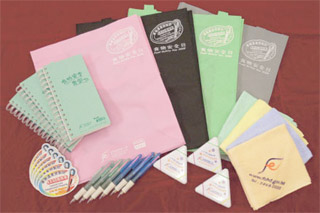
Fabulous Souvenirs for Participants on "Food Safety Day"
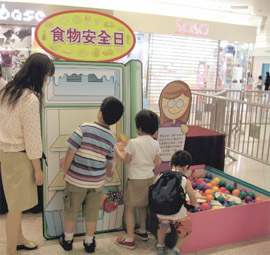
Children Participating at the Game Booths on "Food Safety Day"
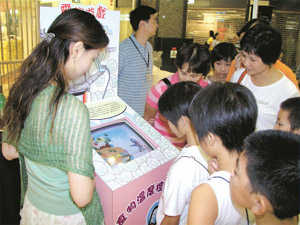
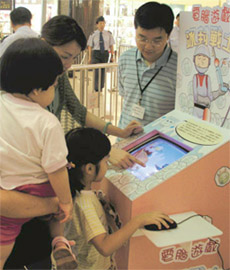
The two computer games, "Bug Buster" and "Young Chef at High Temperature,"
were both fun and educational and were well-received
by the parents and children alike.
(I)(ii) Food Safety Seminar for the Trade
To enhance continuous improvement among the trade on food safety, FEHD organised the second Food Safety Seminar for the trade on June 14 this year at the Lecture Theatre of the Hong Kong Central Library. The Hon Fred LI Wah-ming, Chairman of the Legislative Council Panel on Food Safety and Environmental Hygiene, officiated at the opening ceremony of the seminar.
The objectives of the seminar include:
- To update the trade on the latest developments in food legislation in Hong Kong
- To introduce the latest food safety measures and promotional activities of FEHD
- To promote the HACCP and HACCP based food safety plans
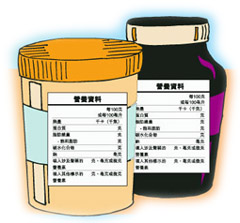
The programme run-down of the seminar was as follows:
- A Nutrition Labelling Scheme to Enhance Public Health
- Reduction of Acrylamide in Food
- How to Prevent Food Poisoning in Food Premises
- Development of HACCP in Local Food Trade
- Recent Developments in Food Safety Legislation in Hong Kong
- Food Surveillance and Control in Hong Kong
- Labelling Requirements in Prepackaged Food
- Importation of Live Food Animals and Exportation of Food of Animal Origin in Hong Kong
- Licensing Regime of Restaurants and Other Food Business
- Risk-based Inspection of Licensed Food Premises
At the Q&A sessions of the seminar, the trade exchanged views enthusiastically with the Department on specific topics, demonstrating the importance of communication between the two sides.
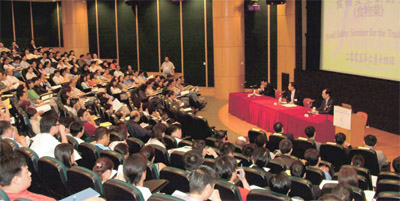
Food Safety Seminar 2005
(II) Food Consumption Survey
 The Food and Environmental Hygiene Department (FEHD) is conducting Hong Kong's biggest and most comprehensive food consumption survey to collect information on food consumption patterns of the general public and evaluate the risks associated with food. In the past, only small scale studies for collecting food consumption data were conducted in Hong Kong. As no territory-wide food consumption data was available, it is crucial for FEHD to conduct this food consumption survey to establish a comprehensive database for food safety risk assessment. The survey will also enhance the department's risk assessment capacity. Moreover, such information will be useful for the Government to formulate public policies and education strategies to promote food safety in Hong Kong.
The Food and Environmental Hygiene Department (FEHD) is conducting Hong Kong's biggest and most comprehensive food consumption survey to collect information on food consumption patterns of the general public and evaluate the risks associated with food. In the past, only small scale studies for collecting food consumption data were conducted in Hong Kong. As no territory-wide food consumption data was available, it is crucial for FEHD to conduct this food consumption survey to establish a comprehensive database for food safety risk assessment. The survey will also enhance the department's risk assessment capacity. Moreover, such information will be useful for the Government to formulate public policies and education strategies to promote food safety in Hong Kong.
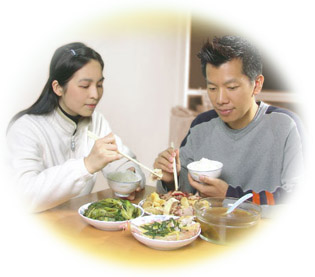
The food consumption survey will collect food consumption data of the local population, such as (1) types of food intake, (2) amounts of food intake and (3) dietary habit. FEHD has commissioned the Chinese University of Hong Kong (CUHK) to conduct this survey. The CUHK survey team consists of experts in nutrition, public health and statistics as well as well-trained interviewers.
From March 2005 to March 2006, selected households will receive an invitation letter from FEHD explaining the interview arrangement. Selected household will be invited to contact the CUHK Survey Unit by telephone so that one participant can be recruited from each household. For further information, please call the FEHD Hotline 2868 0000, or call the CUHK Survey Unit at 2609 6876 during office hours, or e-mail to the CUHK Survey Unit at hkfcs@cuhk.edu.hk.
Invited households are appealed to render their full support and cooperation by accepting the interview when called upon and providing accurate information.
Food Safety Tips
(I) Provision of Fresh Water Hairy Crabs Fit for Consumption
 When refreshing wind blows, we know that autumn has arrived. Autumn is the season for outings and seasonal delicacies, such as hairy crabs. Many people would either consume hairy crabs in a restaurant, or purchase hairy crabs from a retail outlet for cooking at home.
When refreshing wind blows, we know that autumn has arrived. Autumn is the season for outings and seasonal delicacies, such as hairy crabs. Many people would either consume hairy crabs in a restaurant, or purchase hairy crabs from a retail outlet for cooking at home.
To safeguard public health, the trade should heed the following advice before providing hairy crabs to customers for their safe consumption.
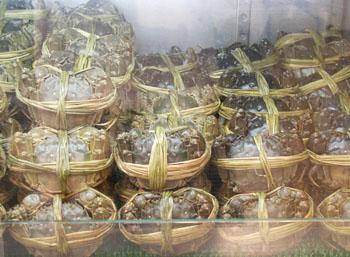
Sale
- Retail outlets should buy hairy crabs from reliable suppliers, and demand a health certificate from the relevant export authority.
- Hairy crabs for sale should be kept in a refrigerator in which an appropriate humidity level is maintained in order to keep the hairy crabs fresh.
- Do not sell dead hairy crabs.
Preparation
- Brush and wash the shells and claws with water before cooking.
- Completely remove the offals of hairy crabs.
- Cook thoroughly before serving, as hairy crabs may contain parasites. Do not sell hairy crab dishes that are raw or not thoroughly cooked.
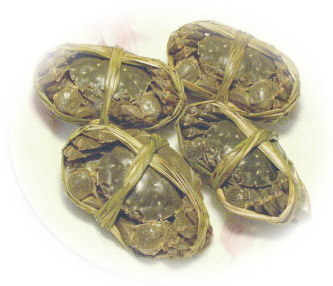
Consumption
- Store the hairy crabs separately from other foods in the refrigerator to avoid cross-contamination.
- Clean the refrigerator thoroughly after storing hairy crabs.
(II) How much do you know about Noroviruses?
Noroviruses have been identified as one of the major causes of non-bacterial gastroenteritis in many countries. Although it can cause food poisoning, this foodborne hazard can easily be prevented. Let us learn more about the viruses.
| Q: | What are Noroviruses? | |
| A: | 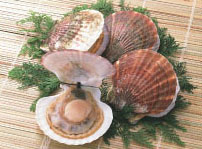 Noroviruses are also known as Small Round Structure Viruses (SRSVs). Gastroenteritis caused by Noroviruses is usually mild and self-limiting. Symptoms include nausea, vomiting, non-bloody diarrhea and abdominal cramps. According to the literature, Noroviruses are common pathogens of viral gastroenteritis. As the disease caused by Noroviruses is more common in winter, it is also known as "Winter Vomiting Syndrome" . Noroviruses are also known as Small Round Structure Viruses (SRSVs). Gastroenteritis caused by Noroviruses is usually mild and self-limiting. Symptoms include nausea, vomiting, non-bloody diarrhea and abdominal cramps. According to the literature, Noroviruses are common pathogens of viral gastroenteritis. As the disease caused by Noroviruses is more common in winter, it is also known as "Winter Vomiting Syndrome" . |
|
| Q: | How do the Noroviruses spread? | |
| A: | Infected human is the only known host for Noroviruses. Fecal contaminated food and water are the main media of transmission. Other modes of transmission include person-to-person spread, direct contact with contaminated objects and aerosol spread. | |
| Q: | What kinds of food are prone to be contaminated by the viruses? | |
| A: | 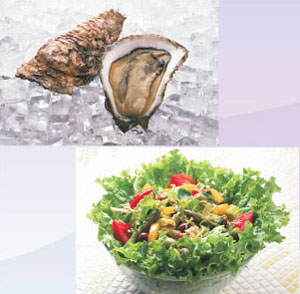 Noroviruses can be found in sewage. Shellfish harvested from polluted water zone or nearby waters and vegetables irrigated with polluted water are more likely to be contaminated by the viruses. Ingestion of raw or inadequately cooked foods (including shellfish, salad and vegetables), is prone to a higher risk of Noroviruses infection. In Hong Kong, ingestion of raw oysters is one major reason of Noroviruses infection. Noroviruses can be found in sewage. Shellfish harvested from polluted water zone or nearby waters and vegetables irrigated with polluted water are more likely to be contaminated by the viruses. Ingestion of raw or inadequately cooked foods (including shellfish, salad and vegetables), is prone to a higher risk of Noroviruses infection. In Hong Kong, ingestion of raw oysters is one major reason of Noroviruses infection. |
|
| Q: | How to prevent Noroviruses infection? | |
| A: | The key to prevention of Norovirus infection is strict observance of food, personal and environmental hygiene. |
Advice to the trade
- Purchase all foods, especially shellfish, from reliable and reputable suppliers.
- When purchasing high risk food like raw oysters, request the supplier to provide a health certificate issued by the health authority of the country of origin certifying that the food is fit for human consumption.
- Food handlers suffering from vomiting or diarrhea should not handle or touch food until at least two days after their recovery.
- Vegetables to be eaten raw or for preparation of salad must be thoroughly washed, properly wrapped and kept in the refrigerator at a temperature of 4oC or below.
- Wash both hands thoroughly with liquid soap and water after toilet and before handling or eating any food.
Activity Highlights
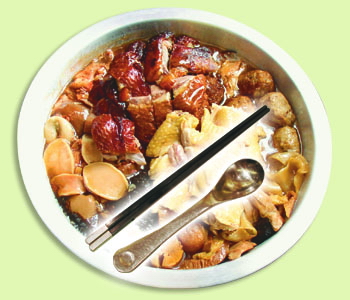
"Poon Choi" Food Safety Seminar
"Poon Choi" , a traditional cuisine which has gained increasing popularity in recent years, comprises numerous ingredients and preparation steps. As more time is needed in preparing "Poon Choi" , it has a greater chance of giving rise to food safety problems. In view of this, the HACCP Team of the Food and Environmental Hygiene Department (FEHD) will conduct a series of seminars on food safety of "Poon Choi" from November 2005 to February 2006.
This half-day seminar will enhance "Poon Choi" suppliers' knowledge on food safety, further securing the quality and safety of "Poon Choi" and, therefore, safeguarding customers' health.
For details of the seminar, please look out for FEHD's invitation letter or visit FEHD's website at http://www.fehd.gov.hk.
Interpretation of Ordinance
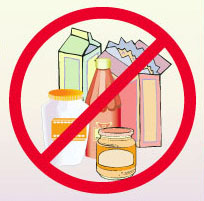
How to control food unfit for consumption?
In Hong Kong, there is a complete set of food ordinance to control and ensure food safety. Section 54 of the Public Health and Municipal Services Ordinance (Cap. 132) requires that all foods for the purpose of sale in Hong Kong shall be fit for human consumption.
Section 59 of the Ordinance authorizes an FEHD officer to seize, remove and destroy any food which is unfit for human consumption to protect public health. FEHD's Health Inspectors will regularly examine foods which are intended for human consumption at import, wholesale and retail levels in addition to examining foods on food premises. If a Health Inspector suspects that the food is unfit for consumption, he may seize and remove such food or affix to such food a mark or seal, or even destroy the food.
Any person who sells food which is unfit for human consumption or any food on which a mark or seal is affixed commits an offence and shall be liable to a fine of $50,000 and to imprisonment for 6 months.